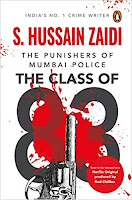Book Review - The Class of 83 by S. Hussain Zaidi (Rating *****)
Hussain Zaidi earned his stripes as an investigative journalist, and later as a non-fiction crime writer, with the stories that featured in Dongri to Dubai: Six Decades of the Mumbai Mafia. But it also came with the criticism that he was writing only about the Muslim mafia and not Maharashtrian gangsters. He followed up Dongri to Dubai with detailed profiles of Arun Gawli, Chhota Rajan and Amar Nayak, which would go on to feature in his 2014 book, Byculla to Bangkok. Criticism followed him again (that he was only writing about the underworld), and Zaidi was determined to pacify his critics; the result was writing about terrorism.
A third challenge presented itself when the ex-journalist was approached by publishers, who observed that he had not written a book about police officers and the police force. This piqued his interest, and encouragement from his protégé Bilal Siddiqi (author of Bard of Blood, The Kiss Of Life, The Stardust Affair) prompted him to begin work on a possible project sooner than he'd planned to. It has culminated in his latest book titled The Class of 83: The Punishers of Mumbai Police, which centres on "a group of prominent encounter specialists who have been credited with bringing back the rule of law in the city", trained by former Maharashtra DGP Arvind Inamdar. They are said to be the only ones trained to tackle underworld in any way they deemed fit – including manipulation and violence. “They were the only ones who were given the brief to kill, and they wiped out most of the gangsters from the city," Zaidi says in an interview to Firstpost.
Though years have passed since his stints at newspapers where he unearthed stories about Mumbai's most feared gangsters at a time when the underworld had the city in its grip, Zaidi’s storytelling skills have endured; he gives detailed characterisations and profiles, along with vivid imagery of the city in the time period the book is set in. “While writing non-fiction, one is guided by only two major elements. First, whatever you write has to be the truth. If not, you may be sued and end up facing a lifelong defamation case in court. Your research should be focused on documents, evidence, FIRs, chargesheets, articles and papers, which will form the backbone of your story. Second, you should ensure the story engages the readers. You have to weave a narrative so that you're able to tell the story in an interesting manner, despite being restricted by the need to remain factual," he explains.
These two elements determine the book's structure and the style one employs while writing crime non-fiction, Zaidi says, and he considers them the toughest part of the process. He says he takes references from Hindi movies to make the story comprehensible to all readers. “Take any holy book – whether it is the Quran or the Bible – they feature a number of parables. Readers need to understand things in the right context, which is why we have to tell stories and use real-life examples, so they understand the perspective... When I'm writing, I want people in other states to follow what I am saying or describing," he says.
Stories about crime often romanticise villains, portraying them as anti-heroes, as a result of which readers sympathise with them irrespective of the heinous nature of their crimes. When asked if he is conscious of such a bias, Zaidi says he writes only for readers, that there was never any intention glorify a particular gang or gangster. "For me, they are just characters in my book. That’s one of my principles," he says. He is unwilling to compromise or change details, even if that means a book will have an ambiguous ending. “Many screenwriters abide by the need to create a good finale or an explosive climax. But in non-fiction that cannot always happen. You ensure that you remain true to the facts in the story and let the readers decide whether the book's end has given them a sense of closure or catharsis.”
The lives of criminals can seem so unreal that it is no surprise readers question whether the worlds they inhabit in books truly exist. Zaidi acknowledges that there is never an impulse to add fictional bits to his non-fiction books, because there's so much meat in real-world stories about crime and law and order. “There is already so much of interest in the real world that you don’t have to create a person or fabricate details to enhance the reading experience."
His first book Black Friday, written in 2002, was adapted by Anurag Kashyap into a feature film that would go on to be banned. Cut to 2019, when The Class of 83 is soon going to be released as a Netflix Original produced by Red Chillies. Zaidi observes that a lot has changed, "Previously, it was difficult to get personal interviews...When I was working on Dongri to Dubai, it was very difficult to catch hold of gangsters and talk to them. Today, with social media, doing interviews has become much easier.”
Zaidi takes the backseat in those instances when his books are used as source material or references for films and series. “To me, writing the books with factual accuracy is more important than what is portrayed on screen. Mostly, I have never had conflicts with filmmakers. I let them make whatever they want,” he says. He asserts that he's never writing with the intention that he wants his book to be adapted for the big screen. He believes writing with such a thought involves taking "so much of artistic licence that one compromises with the very act of writing a book.”
Source - Firstpost, Suryasarathi Bhattacharya, 03 December 2019




Comments
Post a Comment